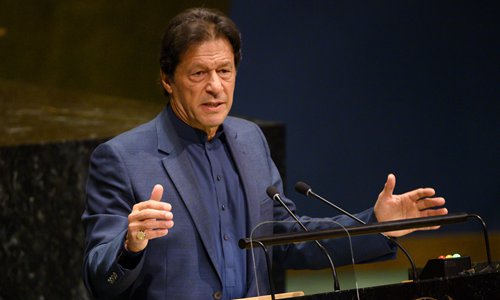
Pakistani Prime Minister Imran Khan File Photo: IC
The idea that India is supposed to lean to the Western world to counterbalance China is going to be very detrimental for India, Pakistani Prime Minister Imran Khan told the Global Times during an online press conference on Tuesday.
He said that China is too strong. India will benefit from trade with China, which is much more advantageous than acting as a sort of counterbalance, Khan mentioned, adding that if a country will lose out, it is going to be India.
Khan noted that relations between China and Pakistan have nothing to do with India. The two countries have a long history of diplomatic ties. "Our bilateral relations are extremely strong," Khan said.
Recently, Khan has been under vicious attacks from some Western media outlets because he did not criticize China's policy in Xinjiang during an interview with Axios news website. Some even claimed that the interview showed how China buys silence over Uygurs.
Asked about how he would respond to these voices, Khan told the Global Times that the version from China about what is happening in Xinjiang is completely different to what is being portrayed by Western media and Western governments.
"We have a very strong relationship with China based on trust. So we actually accept the Chinese version," he said.
He criticized Western media for being "hypocritical" as they turned a blind eye to the serious human rights problems in Kashmir.
During Tuesday's press conference, Khan also congratulated China and the Communist Party of China (CPC) for the 100th anniversary of the founding of the Party. He highly praised China's anti-corruption fight and the miracle that China and the CPC were able to lift hundreds of millions of people out of poverty.
He told media that the CPC is a unique model. While they had been told that the best way for a society to improve itself is to follow the Western system of liberal democracy, the CPC actually beat all Western democracies by nurturing a society that brings things forward.
"What the CPC has done is that, without that electoral democracy, it has actually fared much better. What I saw in China when I visit the Communist Party headquarters and when they give us briefings about their system of sifting talent and then grooming it and bringing it up, for me it is probably more remarkable than any electoral democracy."
He stressed that the CPC has a flexible system when they want to try something. The system allows them to bring a change, while in Western democracies it is very difficult. Besides, China has long-term planning while in an electoral democracies people only look for the next presidential term.
This year also marks the 70th anniversary of the establishment of diplomatic ties between China and Pakistan. Khan stated that Pakistan is committed to strengthening its political relations with China, as well as in the economy and trade.
"The China-Pakistan Economic Corridor is a flagship program of the Belt and Road Initiative, and for Pakistan, it is the one program which gives us the greatest optimism and hope for our future economic development."
He said that Pakistan hopes to attract Chinese industry to the country's special economic zones by offering incentives to businesses. "In Pakistan, the labor is much cheaper than in China. We hope to attract businesses which will benefit from our cheaper labor."
Pakistan also hopes to get more help from China to develop its agriculture and improve productivity.
Khan said that the great power rivalry between the US and China is taking place in the region. "It creates problems because what the US is doing is building this regional alliance called the QUAD.
"From that point of view, Pakistan thinks that it is very unfair for the US and all other powers like us to take sides. Why do we have to take sides as we should have good relationship with everyone? It is not going to happen if this pressure is put on Pakistan to change its relationship or downgrade relations with China. Because relations between Pakistan and China are very deep. It is not just between governments, It is a people to people relationship," he said.




